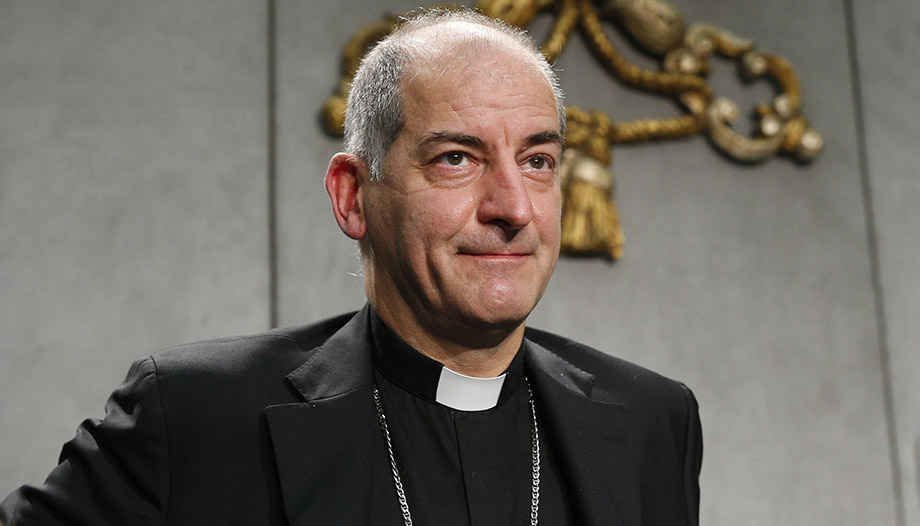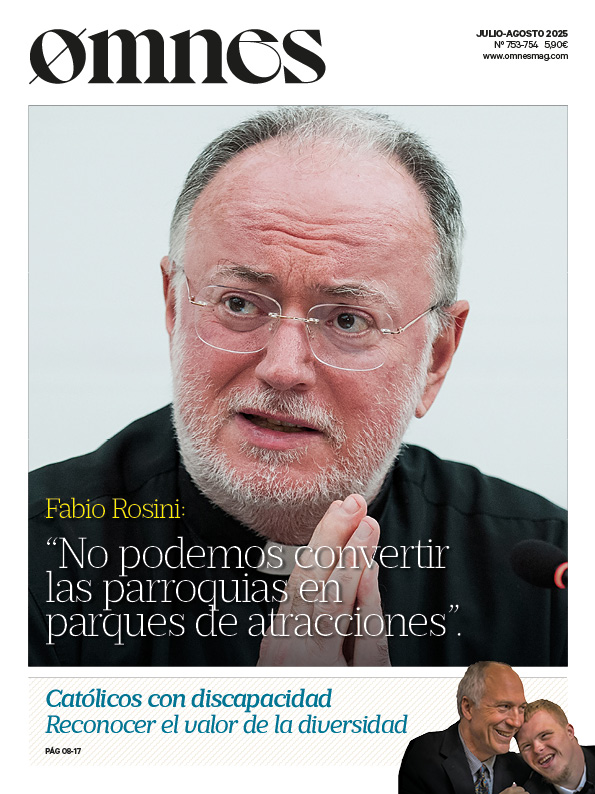Giovanni Pietro Dal Toso is apostolic nuncio in Jordan and Cyprus since 2023. He holds a Doctorate in Philosophy from the Pontifical Gregorian University and a degree in Law from the Pontifical Lateran University. As secretary delegate of the Dicastery for the Service of Integral Human Development, the Holy Father entrusted him in 2017 to visit Aleppo during the conflict in SyriaHe was appointed to the Pontifical Mission Societies, with the aim of accompanying Christians who were suffering from war and terrorist attacks. That same year he began his presidency of the Pontifical Mission Societies.
Dal Toso's experience in places of conflict where different religions coexist gives him valuable insights for the Church and the Vatican's diplomatic mission, which, in his own words, promotes the consideration of "problems in the light of ethical principles".by placing in the center "the good of the people, which is the true criterion that politics has to pursue.".
What challenges does the Church face in its pastoral work in such a pluralistic context as Jordan and Cyprus, where diverse religions and cultures coexist?
-As you say, the situation in Jordan and Cyprus is very different from a historical and religious point of view. I start with the aspects that are most similar. In fact, politically, there is a lot of cooperation between these two countries. In a nutshell: as Cyprus is the bridge between west and east, so Jordan is the bridge between east and west. Cyprus is the side of the European Union closest to the Middle East, and Jordan is the country closest to the West among the Arab countries. The immigration issue also unites them, because in Jordan there are refugees from Palestine, Syria and Iraq, while Cyprus is the European country with the highest percentage of immigrants, because, as we know, many see Cyprus as the gateway to Europe.
From a sociological point of view, religiously the situation is completely different. Jordan is a kingdom where the vast majority of the population is Muslim, while in Cyprus, at least in the southern part, the population is mostly Orthodox and of Greek culture; in the occupied northern part almost all belong to Islam. But since things are never simple, another distinction must be made. The Latin Patriarchate of Jerusalem extends to Jordan and Cyprus: in other words, the Ordinary for Latin Catholics in both countries is the Patriarch of Jerusalem. In Jordan there is also a Greek-Melkite diocese, and parishioners of the Syro-Catholic, Chaldean, Maronite and Armenian rites, that is, six Catholic rites, while there are also Orthodox, Anglican and Protestant Christians. In Cyprus, next to the Latin community, an important Maronite community survives after 1000 years, with its own archbishop.
As can be seen, the situation is quite complex. It is a richness to have so many rites, but this can also be a weakness, since Catholics are numerically few.
What do you see as the role of Vatican diplomacy in promoting peace and interreligious dialogue?
-The promotion of peace, together with support for the specific mission of the Church, is a priority for Vatican diplomacy, and not only in the Middle East. The word of the Holy Father always exhorts peace between nations, and always indicates the path of dialogue, not conflict, as the way to coexistence between peoples. It is clear that in the situation of the Middle East all this has a particular value, because this region has long suffered from conflicts in and between different countries.
The strength of Vatican diplomacy is not economic or military strength, but is realized through the word, the exhortation to consider problems in the light of ethical principles for the good of people, which is the true criterion that politics has to pursue.
Pope Francis has also underlined the principle of fraternity: we must look at the other as a brother, because we share the same humanity, and not as an enemy or stranger. This vision of the Pope has been realized in particular with the document on Human Fraternity for Human Peace and Common Coexistence, which he signed in 2019 in Abu Dhabi with the Chancellor of the University Al Azhar of Cairo. This means that dialogue between different religions can also be based on the principle of fraternity and in this sense contribute to peace.
How would you describe the relationship between the Catholic Church and the other religious communities in Jordan?
--If we talk about other religious communities in Jordan, we have to distinguish between Christian communities and non-Christian communities. People usually do not pay much attention to whether the person is Catholic or Orthodox: in common parlance a distinction is made between Christians and Muslims. Jordan is a country known for good relations between Christians and Muslims. I cannot forget an event in the first months of my mission, when in a homily I spoke about the coexistence between Christians and Muslims. After the celebration, a Christian gentleman came up to me and told me that we should not speak of coexistence, but of familiarity. This is what good relations between the two communities look like.
This does not mean that there are not sometimes tensions, especially in historical moments when radicalism gains strength. But I must also add that the Royal House of Jordan is very supportive of interfaith harmony. In this regard it is worth recalling the Institute for Interfaith Studiesfounded in 1994 by Prince Hassan, uncle of King Abdullah II, which promotes interfaith dialogue, not only in Jordan.
In Jordan, Christians constitute a small part of the population. What challenges does the Church face in its pastoral mission there, and what measures are being taken to support the local Christian community?
-The most serious challenge for our Christians, especially the young, is the "utopia of the West". Many want to leave the country to move to Europe, America or Australia. This phenomenon is found all over the Middle East and it worries us a lot, because Christians are an integral part of the Arab world. Sometimes I worry that in the West "Arab" means "Muslim". This is not the case. Although small, the Christian population has contributed a great deal, and continues to contribute, to the good of societies in the Middle East. This is a historical fact.
But the question does not concern only the social aspect: the Christian communities here are the direct heirs of the first Christian communities. Here in Jordan there are very many remnants of the first Christian centuries. The fact that Christians want to leave these countries is a challenge in many ways.
It is also important to remember that secularism influences everywhere, particularly through the media. It is a pervasive culture, which stops at nothing and which we perceive in our regions. A clear sign in this regard is the drop in the response to priestly and religious vocations. For this reason, faith formation remains a priority, especially for young people.
Cyprus has historically been a divided island, with tensions between its constituent communities. How is the work of the Church experienced in this political and social context? What efforts is the Church making to promote reconciliation?
-The division of the island of Cyprus dates back to 1974, when Turkish troops invaded the island and proclaimed an independent Republic, which however is not recognized internationally, except by Turkey. It is clear that this division deeply scars the island, because over time it has caused severe suffering. Many have had to abandon their homes and possessions to move to one or another part of the island. Not all of these wounds have healed. Attempts at reconciliation between the parties were made, but unfortunately did not bear fruit.
Even in this case the Church can do little, especially because, as we have said, it is a small minority. But also in this case, for example, there is an attempt to promote interreligious dialogue with some initiatives. However, at the moment the role of the Catholic Church in Cyprus, especially that of the Latin rite, is to adapt to the new circumstances in which it carries out its mission. I am referring to the fact that the number of Catholic immigrants from Africa, for example, who need pastoral care, is constantly growing. For this reason, the pastoral structures on the island are being strengthened and last year a Latin bishop was also ordained as Patriarchal Vicar of Jerusalem, in order to give a fuller configuration to this Church. The Maronite rite part, however, has grown a lot in recent years because many Lebanese, faced with the uncertainty of the situation in Lebanon, have preferred to move to the island of Cyprus, which is not far from their country.
Jordan is a key country in the Middle East for political and religious stability. What role does the Catholic Church play in supporting efforts for peace and mutual understanding in such a complex region?
-I think I can say that the efforts of the Holy See in our region are remarkable. Without going into details, it can be seen, for example, already in the trips of the Holy Father, who in these years visited Jordan, Israel, Palestine, Egypt, the Emirates, Iraq and Bahrain. He was also in Cyprus.
As far as I am concerned, with my appointment it was decided to have a resident nuncio in Jordan, whereas before the nuncio resided in Iraq and from there followed Jordan. I say this to underline the importance of this kingdom. The Holy See itself recognizes that the Kingdom of Jordan plays a key role for the stability of the region, and this from a social and religious perspective.
But beyond the diplomatic commitment of the Holy See, the greatest contribution offered by the Catholic Church lies in forming people, in fostering respect and coexistence, in instilling positive values in people's consciences.
Another aspect not to be forgotten is the pilgrimage to the holy places of Jordan, which is part of the Holy Land, because many biblical events took place there and also related to the life of Jesus. Pilgrimages to Jordan contribute to strengthening local Christian communities and fostering relations between East and West. The encounter means mutual knowledge.








